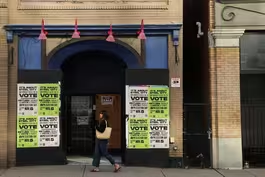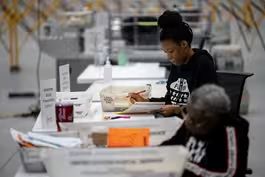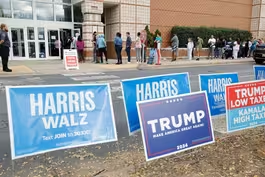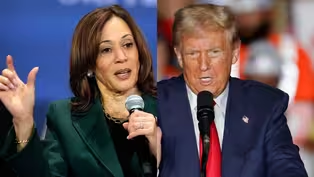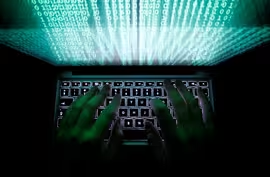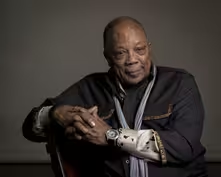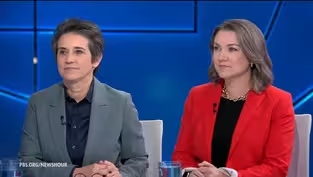
Legal challenges could prolong or disrupt the election
Clip: 11/4/2024 | 5m 36sVideo has Closed Captions
A look at the legal challenges that could prolong or disrupt the election
The tight race for the White House is fueling a wave of election litigation by both Democrats and Republicans as they spar over the ground rules for early voting, mail-in ballots and voter eligibility. Geoff Bennett discussed what's to come with election law expert David Becker of the nonpartisan Center for Election Innovation and Research.
Problems playing video? | Closed Captioning Feedback
Problems playing video? | Closed Captioning Feedback
Major corporate funding for the PBS News Hour is provided by BDO, BNSF, Consumer Cellular, American Cruise Lines, and Raymond James. Funding for the PBS NewsHour Weekend is provided by...

Legal challenges could prolong or disrupt the election
Clip: 11/4/2024 | 5m 36sVideo has Closed Captions
The tight race for the White House is fueling a wave of election litigation by both Democrats and Republicans as they spar over the ground rules for early voting, mail-in ballots and voter eligibility. Geoff Bennett discussed what's to come with election law expert David Becker of the nonpartisan Center for Election Innovation and Research.
Problems playing video? | Closed Captioning Feedback
How to Watch PBS News Hour
PBS News Hour is available to stream on pbs.org and the free PBS App, available on iPhone, Apple TV, Android TV, Android smartphones, Amazon Fire TV, Amazon Fire Tablet, Roku, Samsung Smart TV, and Vizio.
Providing Support for PBS.org
Learn Moreabout PBS online sponsorshipGEOFF BENNETT: The tight race for the White House is fueling a wave of election litigation by both Democrats and Republicans as they spar over the ground rules for early voting, mail-in ballots, and voter eligibility.
For a closer look at that and what's to come, we're joined now by election law expert David Becker.
He's the executive director and founder of the nonpartisan Center for Election Innovation and Research.
Thanks for being with us.
DAVID BECKER, Executive Director, Center for Election Innovation and Research: Thanks for having me, Geoff.
GEOFF BENNETT: So more than 80 million Americans have already voted, key swing states like North Carolina, Pennsylvania, Nevada, Michigan experiencing a high volume of mail-in and absentee voting.
Have you spotted any disruptions, irregularities, any problems that could lead to legitimate questions about the integrity of the vote or the vote count?
DAVID BECKER: It's remarkable.
As you mentioned, we have seen about 80 million ballots cast already.
States like North Carolina and Georgia are over four million ballots cast.
That's likely around 75 to 80 percent of their total turnout already voting.
And we have seen hardly any problems at all, certainly nothing that would involve voter safety or any kind of conflicts at the polling places.
We're really even not hearing many stories about lines.
Most of the stories about lines occurred on the last day of early voting in some states.
And, of course, that always happens.
That's just reflecting enthusiasm and the fact people waited until the last minute a little bit, which is always understandable.
But it's remarkable how smoothly voting has gone, how few problems there have been.
And that's particularly so while we're dealing with things like our foreign adversaries spreading disinformation and the highly divisive environment we're currently in.
It's really remarkable, a testament to our election officials.
GEOFF BENNETT: I want to ask you about that in a bit.
But, first, both parties are preparing massive legal operations to file and respond to litigation on and after Election Day.
2024, according to one estimate, is the most litigated election ever.
What are you tracking in particular?
DAVID BECKER: Well, I think we have seen a lot of preelection litigation.
It's very likely it is the most preelection litigation we have ever seen before.
And we should put this in context.
In 2020, there was a lot of preelection litigation that was trying to clarify rules, particularly changes in adaptations that were made due to COVID.
And it should be noted that Republicans won about 85 percent of those cases preelection in 2020.
In the 2024 election, we're seeing some cases like that, we're seeking to clarify rules, but we're seeing Republicans push last-minute changes a lot more, and we're seeing them lose a majority of cases.
We're seeing things like cases raised about the voter lists, which they have known about for days, weeks, months, years, and could have brought at any given point in time.
We see challenges about mail voting laws that have been around in some cases for decades in states like Nevada.
And then we're seeing challenges to even military and overseas voting procedures that have been around in some cases for as long as 40 years.
So those kinds of cases have been dismissed by courts, even by judges appointed by former President Trump himself.
And we will be then moving on to the post-election period.
We will have to see what happens, obviously.
In a really close election, there is legitimate litigation that can be brought.
Think Florida 2000, when it's that close, hundreds of votes.
But when we see an election that's decided by margins like we saw in 2020, it's very, very unlikely any post-election litigation will succeed.
And that's largely because the candidate who's behind will still have to bring evidence that they can somehow make up the margin.
And once you get over a few hundred votes, it's almost impossible to do that.
GEOFF BENNETT: Well, I was going to ask you that.
Does the number of cases floated by the GOP and Republican-affiliated entities, does that suggest anything about the number of legitimate concerns connected to the vote?
DAVID BECKER: So I think what's been surprising is, it hasn't reflected legitimate concerns.
It seems to be -- have the effect -- we have the normal kind of litigation that seeks to clarify rules that need clarifying.
But there's a lot of litigation, as I mentioned, that seeks to challenge rules that were never going to be successfully challenged.
They were never going to win a lot of those cases.
And you have to wonder if what we will see after the election is that the losing candidate might bring up some of these same dismissed claims to try to suggest the election was stolen.
That would be very dangerous if that happens.
There are a lot of sincere supporters of a losing candidate that could be incited to anger or potentially even violence.
And, of course, we remember that to some degree from 2020.
GEOFF BENNETT: Returning to the issue of foreign interference, which you mentioned earlier, has the effort by U.S. intelligence agencies to expose Russian disinformation, has that been effective in disrupting them and diminishing the impact?
DAVID BECKER: Well, I think our adversaries are highly motivated.
They see a big reward in potentially disrupting our elections.
And, again, they're not disrupting our elections by attacking actual election infrastructure.
We're way too decentralized.
We have paper ballots.
We have a lot of protections and redundancies and checks and balances in place so that no foreign adversary or domestic actor could change or alter the votes in an election.
We should say, for everyone in the United States, don't trust social media.
Don't trust videos.
Don't trust claims about election fraud or something that they're seeing just on the Web.
Trust your local and state election officials.
Go to those sites.
Find out what's really going on.
Do not rely upon social media and the Internet right now, because there's a lot of disinformation.
GEOFF BENNETT: That's good advice.
David Becker with the nonpartisan Center for Election Innovation and Research, thanks for being with us.
DAVID BECKER: Thanks, Geoff.
Breaking down the path to victory for both Harris and Trump
Video has Closed Captions
Clip: 11/4/2024 | 5m 3s | Breaking down the paths to Electoral College victory for both Harris and Trump (5m 3s)
Election security officials tracking attempts to sow chaos
Video has Closed Captions
Clip: 11/4/2024 | 3m 52s | Election security officials tracking misinformation and groups trying to sow chaos (3m 52s)
The final messages the campaigns are giving to voters
Video has Closed Captions
Clip: 11/4/2024 | 5m 13s | The final messages the presidential campaigns are giving to voters (5m 13s)
Harris, Trump make last push to reach voters in final hours
Video has Closed Captions
Clip: 11/4/2024 | 5m 36s | Harris and Trump make last push to reach voters in final hours of voting (5m 36s)
How officials are preparing to fight voter intimidation
Video has Closed Captions
Clip: 11/4/2024 | 5m 47s | How election officials are preparing to fight voter intimidation and potential violence (5m 47s)
Remembering Quincy Jones and his towering legacy
Video has Closed Captions
Clip: 11/4/2024 | 4m 11s | Remembering Quincy Jones and his towering legacy in the music industry (4m 11s)
Tamara Keith and Amy Walter on last-minute poll surprises
Video has Closed Captions
Clip: 11/4/2024 | 9m 18s | Tamara Keith and Amy Walter on voter sentiment and last-minute poll surprises (9m 18s)
Providing Support for PBS.org
Learn Moreabout PBS online sponsorship
- News and Public Affairs

FRONTLINE is investigative journalism that questions, explains and changes our world.

- News and Public Affairs

Amanpour and Company features conversations with leaders and decision makers.












Support for PBS provided by:
Major corporate funding for the PBS News Hour is provided by BDO, BNSF, Consumer Cellular, American Cruise Lines, and Raymond James. Funding for the PBS NewsHour Weekend is provided by...
